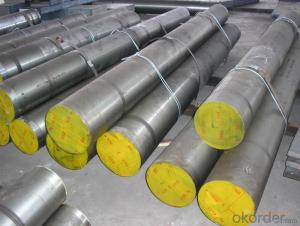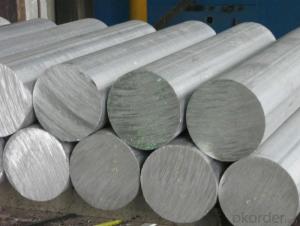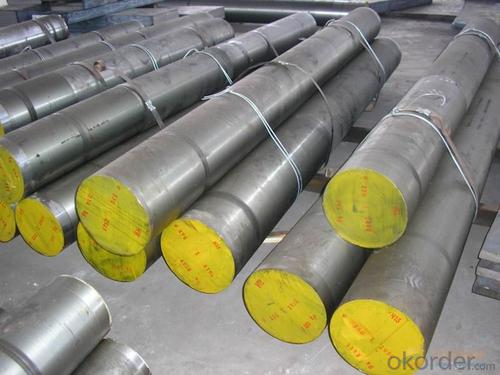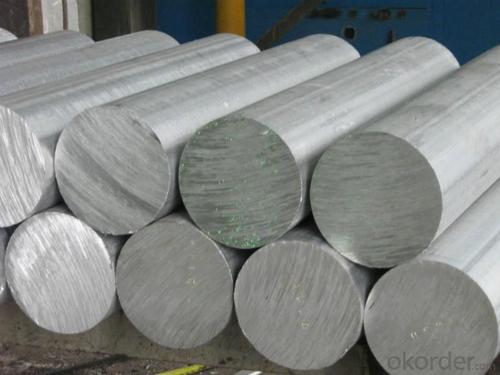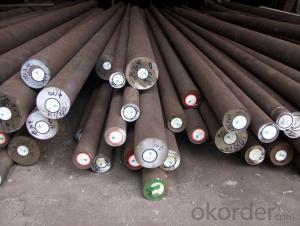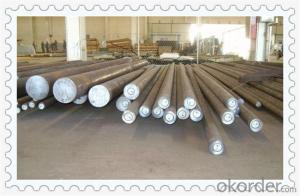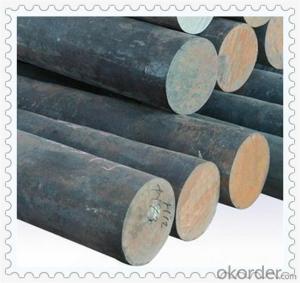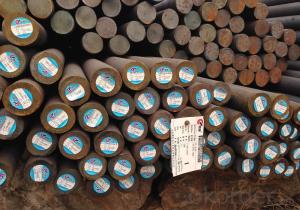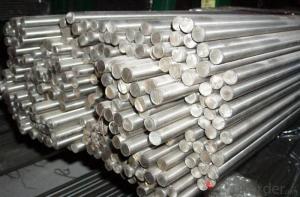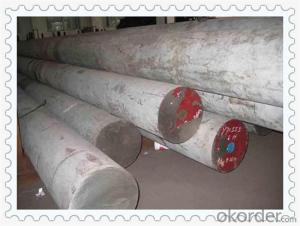ASTM 4140 Alloy Steel Round Bar
- Loading Port:
- Tianjin
- Payment Terms:
- TT OR LC
- Min Order Qty:
- 25 m.t.
- Supply Capability:
- 50000 m.t./month
OKorder Service Pledge
OKorder Financial Service
You Might Also Like
Specification
ASTM 4140 Alloy Steel Round Bar
Product Details:
1) Melting process: BOF + LF + VD
2) Heat treatment: Normalized / Annealed / Quenched / Tempered
3) Surface condition: Black surface / Peeled / Turned / Milled
4) Straightness: Max.3mm/1000mm
5) Appearance: Free of cracks, visible inclusions, pit on the appearance;
6) Guarantee: Ultrasonic test according to SEP 1921-84 G3 C/c
7) Certificate of quality: As per EN 10204/3.1B
8) Marking: Grade, Heat No.,Diameter will be stamped one each bar with required color
9) Packing: In bulk reinforced
10) MOQ: 10 tons / Grade / Size
11) Delivery time: 30 days
12) Payment: T/T 30% deposit, 70% balance upon photocopy of B/L copy, or 100% LC at sight.
Designation by Standards
rand Name | Ravne No. | Mat. No. | DIN | EN | AISI |
42CD4 | 514 | 1.7225 | 42CrMo4 | - | 4140 |
Chemical Composition (in weight %)
C | Si | Mn | Cr | Mo | Ni | V | W | Others |
0.39-0.45 | 0.1-0.4 | 0.6-0.9 | 0.9-1.2 | 0.15-0.25 | - | - | - | - |
Application:
Our products have been used in aviation,aerospace,navigation,nuclear energy,chemical industry,
electronic information,machine manufacture, petrochemical, automotive,instrument and meter, Communication ,transportation, and medical instruments etc.
Product Show:
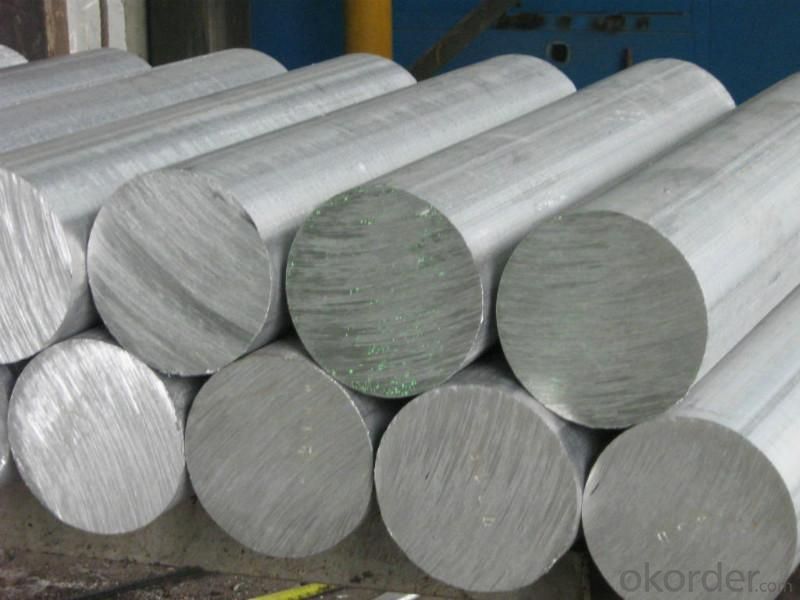
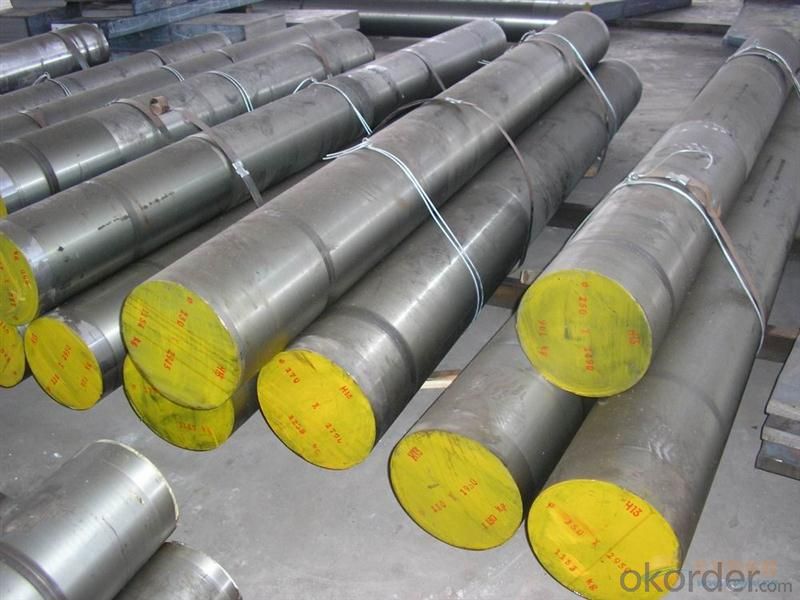
- Q: How does special steel contribute to reducing product costs while maintaining quality?
- Special steel contributes to reducing product costs while maintaining quality through several ways. Firstly, special steel is known for its excellent strength and durability, which allows manufacturers to design products with thinner and lighter components. This reduction in material usage directly leads to cost savings without compromising on quality. Additionally, special steel possesses unique properties such as corrosion resistance, heat resistance, and wear resistance. By using special steel, manufacturers can create products that have a longer lifespan and require less maintenance or replacement. This not only reduces the overall cost of ownership for customers but also enhances the reputation of the brand for delivering reliable and high-quality products. Furthermore, special steel often allows for improved manufacturing processes, such as easier machinability or better weldability, which can result in increased efficiency and reduced production time. These time and cost savings can be passed on to the customers, making the final product more affordable without sacrificing quality. In summary, special steel's strength, durability, unique properties, and improved manufacturing processes contribute to cost reduction while maintaining or even enhancing product quality.
- Q: What are the main characteristics of alloy steel forgings?
- The main characteristics of alloy steel forgings include enhanced strength, durability, and resistance to wear and corrosion. They also offer excellent heat resistance and can withstand high temperatures. Additionally, alloy steel forgings possess good machinability and can be easily shaped and formed into various complex designs.
- Q: What are the common defects found in special steel?
- The defects commonly found in special steel may vary depending on the specific type and manufacturing process employed. However, there are a few defects that tend to be prevalent across different types of special steel. One frequently encountered defect is the presence of surface imperfections, including cracks, pits, or scratches. These imperfections can occur during manufacturing or as a result of handling and transportation. Not only do surface imperfections affect the steel's aesthetic appeal, but they can also compromise its structural integrity. Another defect commonly observed is the existence of internal voids or inclusions. These are small pockets of gas or non-metallic materials trapped within the steel during casting or forging. Internal voids can weaken the steel and make it more susceptible to failure when subjected to stress. Inconsistent composition is also a defect that can arise in special steel. This occurs when the alloying elements are not evenly distributed throughout the steel. Such inconsistency can lead to variations in mechanical properties and render the steel less reliable and predictable in terms of performance. Grain structure defects are another common occurrence in special steel. These defects arise when the grains within the steel are improperly formed or are not uniform in size. Grain structure defects can negatively impact the steel's strength and toughness, thereby increasing its susceptibility to fracture or deformation. Lastly, improper heat treatment can give rise to defects in special steel. Since heat treatment is a crucial process in steel manufacturing, any errors in its execution can result in various defects, such as excessive hardness, brittleness, or poor dimensional stability. It is important to note that while these defects are commonly found, they can be minimized or eliminated through meticulous manufacturing processes, stringent quality control measures, and appropriate handling and storage of the steel.
- Q: How does special steel perform in terms of weldability?
- Special steel generally performs well in terms of weldability. It has good ductility and can be easily welded using various welding methods such as arc welding, resistance welding, and laser welding. The composition and properties of special steel are specifically designed to ensure that it can be successfully welded without compromising its strength and integrity. However, the specific weldability of special steel may vary depending on its exact composition and specific grade. It is always recommended to consult the manufacturer's guidelines and follow proper welding procedures to achieve the best results when working with special steel.
- Q: Is the steel column of the steel structure HM a special steel?
- H steel is a new type of economical construction steel. H type steel cross section shape is reasonable in economy, good mechanical properties, rolling each point on the extended section is uniform, small internal stress, compared with the ordinary beam, a section modulus, light weight, saving advantages of metal, can make the building structure to reduce 30-40%;
- Q: What are the advantages of using special steel over other materials?
- There are several advantages of using special steel over other materials. Firstly, special steel offers superior strength and durability, making it ideal for applications that require high load-bearing capacity or resistance to wear and tear. Secondly, special steel has excellent corrosion resistance properties, which is particularly important for industries such as construction, automotive, and marine. Additionally, special steel can be easily customized and shaped to meet specific design requirements, providing flexibility in manufacturing processes. Lastly, special steel often exhibits high heat resistance and excellent mechanical properties, making it suitable for demanding environments and critical applications.
- Q: How is special steel used in the aerospace sector?
- Special steel is used in the aerospace sector for various applications such as manufacturing engine components, landing gear, and structural parts. Its high strength-to-weight ratio, corrosion resistance, and ability to withstand extreme temperatures make it ideal for enhancing the performance, durability, and safety of aircraft.
- Q: What are the requirements for special steel used in high-temperature applications?
- The requirements for special steel used in high-temperature applications include excellent heat resistance, high strength at elevated temperatures, good oxidation and corrosion resistance, and the ability to retain mechanical properties under extreme heat conditions. Additionally, these steels should have sufficient creep resistance, thermal stability, and resistance to thermal fatigue.
- Q: What are the limitations of using special steel in marine environments?
- Special steel can be susceptible to corrosion and pitting when exposed to saltwater in marine environments. Additionally, the high cost and difficulty in sourcing and maintaining special steel can also be limiting factors.
- Q: How does special steel perform in cryogenic corrosion resistance?
- Special steels are known for their excellent performance in cryogenic corrosion resistance. When exposed to extremely low temperatures, such as those encountered in cryogenic applications, regular steels tend to become brittle and susceptible to corrosion. However, special steels are specifically designed to withstand these conditions and maintain their mechanical properties and corrosion resistance. The performance of special steels in cryogenic environments is mainly attributed to their composition and microstructure. These steels are typically alloyed with elements such as nickel, molybdenum, and nitrogen, which enhance their resistance to corrosion at low temperatures. Additionally, the microstructure of special steels is carefully controlled, resulting in a fine grain size and homogeneous distribution of alloying elements. This microstructure contributes to the steel's ability to resist corrosion and maintain its mechanical strength even at cryogenic temperatures. Furthermore, special steels undergo rigorous testing to ensure their suitability for cryogenic applications. They are subjected to low-temperature impact tests, which assess their toughness and resistance to brittle fracture. These tests verify that the steel can withstand the stresses and strains imposed by cryogenic conditions without failure. Overall, special steels exhibit excellent cryogenic corrosion resistance due to their unique composition, microstructure, and thorough testing. They are a preferred choice for applications that require reliable performance at extremely low temperatures, such as in the aerospace, energy, and scientific research industries.
Send your message to us
ASTM 4140 Alloy Steel Round Bar
- Loading Port:
- Tianjin
- Payment Terms:
- TT OR LC
- Min Order Qty:
- 25 m.t.
- Supply Capability:
- 50000 m.t./month
OKorder Service Pledge
OKorder Financial Service
Similar products
Hot products
Hot Searches
Related keywords
